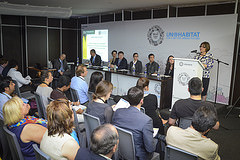
Planet Earth is home to almost seven billion people two thirds of whom live in cities and urban areas. This figure would not say much on its own if it were not for the fact that one in four people lives in informal settlements. Urban inequality has been on the rise since the 1980s, taking the form of social, cultural and economic exclusion. At the seventh World Urban Forum held in Medellin in April 2014, the Organization of American States, through its Department of Sustainable Development, reviewed urban development trends in the region and presented ideas to contribute to sustainable and equitable urban development.
“This is the greatest event in Medellin’s history” stated Mr. Aníbal Gaviria, Mayor of Medellin, referring to the seventh United Nation’s World Urban Forum (Wuf7). Rapidly growing cities have developed into urban conglomerates of intensely divided communities with vastly different levels of access to services and exposed to the risks derived from climate change. In this context, Wuf7 focused on urban equality in development, looking toward identifying solutions for mobility, governance and education, along with the recovery of public spaces and green areas in vulnerable communities and urban slums.
 During the international event, the ECPA Sustainable Communities in Central America and the Caribbean initiative implemented by the Organization of American States (OAS) co-hosted the side event, “Clean Energy and Transport Solutions in an Urban Hemisphere: Lessons from the Americas”. The gathering allowed urban planning experts to exchange ideas on how to replicate sustainable initiatives that advance urban equality. Managers of the OAS-led ECPA initiative discussed best practices in the advancement of sustainable transport and clean energy with experts from San Jose, Salt Lake City, Baja Verapaz, and central New York.
During the international event, the ECPA Sustainable Communities in Central America and the Caribbean initiative implemented by the Organization of American States (OAS) co-hosted the side event, “Clean Energy and Transport Solutions in an Urban Hemisphere: Lessons from the Americas”. The gathering allowed urban planning experts to exchange ideas on how to replicate sustainable initiatives that advance urban equality. Managers of the OAS-led ECPA initiative discussed best practices in the advancement of sustainable transport and clean energy with experts from San Jose, Salt Lake City, Baja Verapaz, and central New York.
Urban development experts have recognized the key role of cities in addressing social inequality, concluding that it is fundamental to assess how their design, governance, and infrastructure impact the lives and opportunities of their dwellers. With this in mind, under the auspices of ECPA, the DSD successfully implemented the first phase of the ECPA Sustainable Communities in Central America and the Caribbean initiative. This initiative focused on four thematic areas: economic development, housing, pollution prevention and environmental protection, and sustainable transport. The work contributed to advancing the concepts of sustainable city, energy sustainability and low carbon economic growth.
 During her keynote address, Ambassador Carmen Lomellin, U.S. Permanent Representative to the OAS, reaffirmed her government’s support of collaborative actions to address global challenges such as air pollution, the growing demand for energy and transportation, environmental protection, and sustainable housing and infrastructure. She also announced the second phase of the Sustainable Communities in Central America and the Caribbean initiative. This second phase of matching grants focused on promoting dialogue, capacity building and peer learning on sustainable urban development and municipal governance starts in June 2014. The OAS/DSD will continue to be the lead implementer of this successful sustainable communities endeavor.
During her keynote address, Ambassador Carmen Lomellin, U.S. Permanent Representative to the OAS, reaffirmed her government’s support of collaborative actions to address global challenges such as air pollution, the growing demand for energy and transportation, environmental protection, and sustainable housing and infrastructure. She also announced the second phase of the Sustainable Communities in Central America and the Caribbean initiative. This second phase of matching grants focused on promoting dialogue, capacity building and peer learning on sustainable urban development and municipal governance starts in June 2014. The OAS/DSD will continue to be the lead implementer of this successful sustainable communities endeavor.
 View Map
View Map